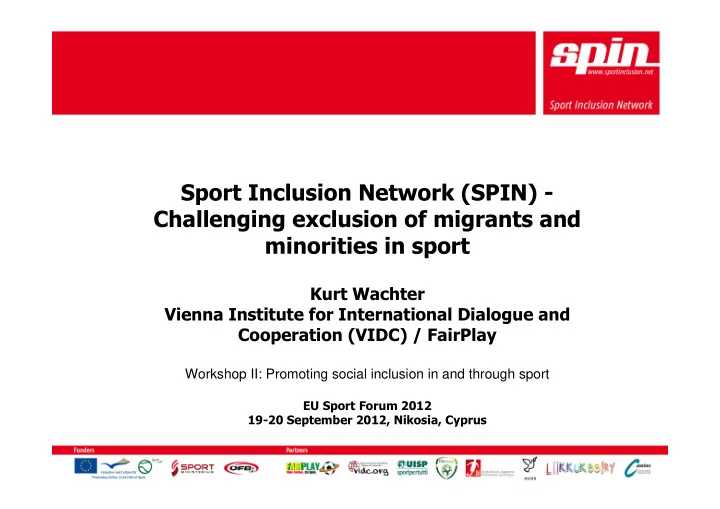

Sport Inclusion Network (SPIN) - Challenging exclusion of migrants and minorities in sport Kurt Wachter Vienna Institute for International Dialogue and Cooperation (VIDC) / FairPlay Workshop II: Promoting social inclusion in and through sport EU Sport Forum 2012 19-20 September 2012, Nikosia, Cyprus
Visible diversity vs. discrimination ● Ethos of the “level playing field” to assure equality of competition ● Increasing visible diversity at clubs and in national teams ● Football arenas are also places of discrimination and racism
Indirect forms of discrimination ● Systematic under-representation of migrants and minorities and their exclusion from positions of authority or status ● Ethnic minorities are under-represented in sport administration, management and coaching ● Absence of minority fans in stadiums
Exclusion through regulations Discriminatory regulations in amateur sport limit the participation of ethnic minorities or foreign nationals in sport Key finding of the FRA-study: In amateur football: numerous quota systems for EU-citizens or third-country- nationals, ranging from one to five 'foreign players' per team and game who are allowed to participate Examples: • In Italy ban on third-country-nationals in amateur football; • In Austrian amateur football only 3 non-Austrian Citizens are allowed per team (only immigrants under 18 are exempted from this rule)
Institutionalised racism ● Disparity between the high number of black players and the lack of black or ethnic minority fans ● Only 1% of the active fans are of ethnic minority background ● Almost no black coaches in professional football
Expected results of the SPIN project • Increase networking and sharing of best practices among European & national sport stakeholders how to pro-actively involve migrants in and through sport • Greater awareness and knowledge about appropriate methods among sport administrators how to counter the social exclusion of migrants in their associations or clubs • Learning from football and transfer of knowledge to other sports on mainstreaming intercultural action and equal opportunities’ policies • Empower and capacity-build migrant football teams and initiatives including refugees and asylum seekers in order to participate in regular leagues and competitions
Main project activities Sport Inclusion Network (SPIN) – Involving migrants in mainstream sport institution 1. Train the Trainers Workshops In May 2011 the Italian sport for all assocaition UISP hosted in Bologna a two-days European workshop where two trainers of each partner organisation were trained.
2. Inclusion Workshops for Sport Clubs & Associations Each partner organised two Inclusion Workshops in their respective countries. One was targeting the key staff or members of the football association or a professional football club and the second a non-football sport association or club.
3. Football Refugee Day • Launch of a Football Refugee Day to mark the UN World Refugee Day on 20 June; SPIN partners organised multi-cultural tournaments & public events with refugees backed by UNHCR • Aim was to celebrate the power of football to overcome the exclusion of refugees and asylum seekers and to highlight their contribution to the game. Football Refugee Day in Bicske Refugee Camp (Hungary) Zlatko Junuzovic, Austria & Fatmire Bajramaj, Germany Werder Bremen
4. European Conference: Sport & Integration – Challenging social exclusion in and through sport In Sept. 2011 the networking conference brought together sport & integration experts and migrant activists to discuss with sport stakeholders & policy makers current challenges and exchange best practices (107 delegates from 76 organizations representing 22 countries) 5. European Seminar: Involving young immigrants in winter sports In January 2012 multipliers have been invited for a seminar during the first Winter Youth Olympic Games (WYOG) in Innsbruck. It was the first meeting to focus on winter sports and the questions of involving young talents from migrant communities and how sport organisations can overcome stereotyping.
Main project activities 6. Good Practice Guide The Good Practice Guide brochure looks at various stakeholders in the 6 partner countries plus UK and presents 45 promising good practice examples. It should help raising awareness and generating public support for the integration agenda among sport stakeholders. Main Output: Indicators and quality criteria, which could serve as a guideline for the assessment of the inclusion potential of various sport offers, projects and programmes.
Lessons Learned • Lack of hard evidence: Mo studies or research about the low sports participation of migrants, that allows us to correctly evaluate the present situation. • Young immigrant athletes and players, migrant communities from third countries, female migrants, refugees and asylum seekers ‒ are all underrepresented in sport. Migrants and ethnic minorities are almost completely absent in the roles of coaches, club managers, or positions in sport federations. • The participation of female migrants is even lower, therefore specific gender sensitive sport programmes are need. • Lack of systematic lobbying and networking activites of minority groups. Pressure from outside essential to change policies and practices of mainstream sport institutions
The way forward ● Starting point is to admit that diversity is something the club or organisation wants to achieve. ● Second step is to understand the exclusionary practices and daily procedures which need to be changed to become inclusive ● Sport bodies need to open up to the society at large and ensure that they are seeking advice and integrate minority communities etc. ● Partnerships with and visibility of discriminated groups are essential ● Minority groups need equal access to public funding and sport infrastructure
Recommend
More recommend